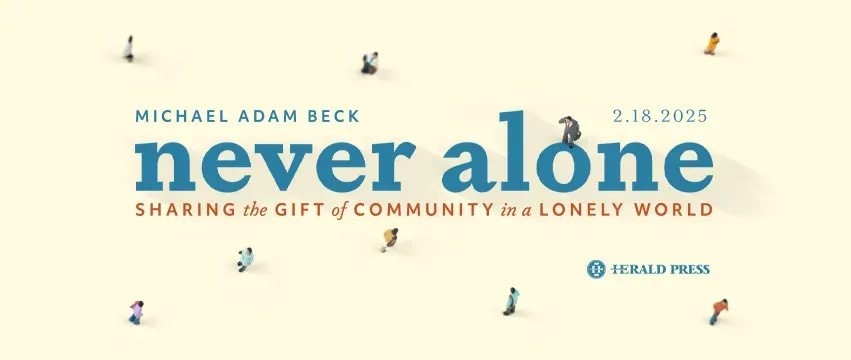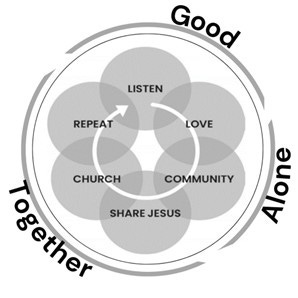“So you’re really making a case for what you call ‘original goodness’ that human beings are innately good, not ‘totally depraved,’ right? Considering the recent sociopolitical situation in the United States, do you really still believe this?”
Last week, I was interviewed by a reporter about Never Alone. He’s weaving the book into a story he’s working on about the epidemic of loneliness.
His question stunned me for a minute. I mean if you just scan reliable daily news sources it would be easier to make a case that human beings are the opposite of good. We are bad. The earth is doing bad things in terms of drastic temperature changes and natural disasters. Society is bad. Our political situation is bad. Institutionalized racism. Exploitation of the vulnerable, the orphan, the widow, the immigrant.
After a kind of mini-apocalypse played out in my mind, I started to think of the faithful saints in my church who voted to turn their church building into an inpatient sober housing program. They also show up every week to prepare a meal and join at table with those experiencing homelessness. I thought of the team who goes into the substance abuse rehab every week to be church with the residents at Higher Power Hour. I thought of my daughter, a registered nurse who cares for the sick and suffering every day. Each week I have the students in my undergraduate sociology class reflect on compassion practices they are trying to live out… I thought of them too.
In other words, I thought of the small acts of compassion that human beings do every day, in the face of the overwhelming evil that pervades the headlines.
“Yes. Jim, I believe human beings are fundamentally good.” I responded. “And I know this puts me in the heretic circle.”
For me, goodness is the first of three movements that is the “Gospel” that Christians proclaim.
In the Beginning…
At the heart of the creation story in Genesis is a profound declaration about humanity: “God saw all that he had made, and it was very good” (Genesis 1:31). The stars… good. The seas… good. Every living species… good. Then we get to human beings…. “very good.”
In the beginning… very good.
This “very good” is a foundational truth that we often overlook in our struggle with self-worth. From the very beginning, God created humanity as an image-bearer of divine goodness. Goodness is woven into the fabric of creation and into every person. Imago Dei “image of God” let me spell that out IMAGO… D E I. The profound diversity of human beings is an expression of God’s own identity and creativity. At the center of the creation narrative is the first portrait of diversity, equity, and inclusion. A good God who is Trinitarian community, creating good human beings to live together in community with God and each other.
The message of “goodness” speaks to the essence of who we are—a reflection of God’s love, not a product of failure or defect (if you are waiting for the fall, sin, and depravity stuff… come back next week).
Designed for Love
Dacher Keltner, professor of psychology at UC Berkeley and the director of the Greater Good Science Center, explores the compassionate nature of the human species, arguing that empathy, kindness, and compassion are not just learned behaviors but intrinsic aspects of human nature (2009). These qualities reflect the original goodness inherent in humanity, suggesting that our natural inclination towards caring for others is rooted in evolutionary biology and our shared humanity. Keltner’s research highlights that humans are biologically wired to form connections, offer support, and act with compassion, even in the face of adversity. This compassionate impulse reflects a deeper truth about the human condition—that at our core, we are designed for love and relational harmony.
By recognizing the compassionate aspects of our nature, we can better understand the profound interconnectedness of all people and the divine goodness that underpins human life. Thus, Keltner’s work supports the notion that original goodness is not an abstract theological idea but a fundamental part of our evolutionary and moral makeup.
The foundational role that compassion plays in the life and teachings of Jesus, is an essential aspect of the New Testament. Compassion is a combination of cognitive, affective, and behavioral responses to the suffering of self and others. It’s an empathetic response that moves us not only to feel but also to act. Jesus’s own compassion is not just an abstract concept but an emotional and physical response to human suffering. The use of the Greek word splanchnizomai emphasizes a gut-level reaction—compassion that emanates from the depths of one’s being, physiologically— literally from the bowels.
Making the Good News Good Again
When we gather at Higher Power Hour in the rehabilitation center in Ocala, Florida, we witness an awakening to original goodness in real time every Monday night. Residents, some court-ordered and others self-admitted, come together each week to share their struggles, hope, and newfound spirituality. What has emerged over the years is a reframing of our identities—from loneliness to beloved community. The message that Jesus shared with the disinherited was one of restoring the imago dei currently marred by the original trauma. I’ll reinterpret the sequence from Matthew 5:17-48 like this…“You have heard it said, you are irreparably bad, not enough, less than, but I say to you, you are good, enough, beloved.”
This reframing is more than just a change in language, it’s a radical transformation of how we see ourselves and each other. Humanity’s inherent goodness is not about moral perfection but about reflecting the deep relational nature of God. We were created to live in community, in relationship with God, one another, and the world around us. From the first breath of life in Genesis 2 to the ongoing cycle of creation and care, we are called to live in harmony with all that God has made.
God’s goodness is not just an attribute but an invitation to partake in the beauty of creation and the flourishing of life. Each of us is an extension of God’s goodness—a living, breathing image of the divine. The relational nature of our being means that our goodness is meant to be shared, not hoarded. When we understand this, we see that compassion is not just about helping the marginalized or broken. It’s a fundamental part of our wiring and nature. The ability to know, to delight, to feel with, and to love. This is foundational to the ability to participate in community and love the way God created us to.
The research of evolutionary psychologists like Dacher Keltner and the reflections of contemplatives like Thomas Merton converge around this truth… compassion is hardwired into the human condition. This isn’t just a cultural construct but a reflection of the deeper truth that humanity is designed for love. As a species, we are naturally compassionate—“survival of the kindest,” as Keltner puts it. Our deepest instinct is not self-preservation but the care and well-being of one another.
This understanding invites us to embrace the goodness that is already in us. Just as God’s creation is good, we are intrinsically good—created for connection, love, and compassion. The voice of Jesus echoes through history, inviting us to see the world and ourselves through the lens of goodness: “You are beloved. You are good. So is your neighbor. All of them. Love God. Love yourself. Love your neighbor.”
Let this truth be the foundation from which we live: we are not defined by our mistakes or our shortcomings, but by the goodness of God that resides within us. May we reflect that goodness in every relationship, every act of compassion, and every step we take as co-creators in this very good world.
Join the Never Alone Release Day webinar! Registration is free…








Thanks for the insight.
Good stuff. Thanks.